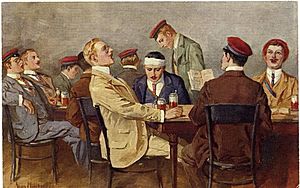Cantus facts for kids
A cantus (which means "singing" in Latin) is a fun and traditional event organized by student groups, mainly in countries like Belgium, the Netherlands, France, and the Baltic states. It's a bit like a big sing-along party where students sing old songs and enjoy drinks together. These events follow very old and strict rules.
The idea for cantus events came from Germany a few centuries ago. Some of the songs sung at a cantus are even older, dating back to the Middle Ages! Cantus events are similar to other student traditions like commercium and sitsit.
In 2019, the city of Rotterdam in the Netherlands set a world record for the largest traditional cantus. Their "Eurekaweek" event welcomed 4,594 registered guests!
The Songbook: Codex
The songs for a cantus are collected in a special book called the codex. This book contains the anthems (special songs) of many student organizations. It also has hundreds of other songs in different languages, including Dutch, French, English, German, Latin, and Afrikaans.
Most of these songs have simple, well-known tunes. Nearly all of them were written before World War II. They often talk about student life, love, or the history of a country, city, or region. Because of this, students from different cities might sing different songs. For example, students from Ghent usually won't sing songs about Leuven, and vice versa. Sometimes, they might even change the name of a city in a song to their own!
Since many songs are very old, some of them have ideas that might not be acceptable today. Students sometimes discuss these songs and might choose to change them or not sing them at all.
Different cities and regions in Belgium use different versions of the codex. For example, in Antwerp, Hasselt, Leuven, and Aalst, they use a codex published by the KVHV (a Catholic Flemish Students Union). In Brussels, Flemish students use a codex published by the Polytechnische Kring and Brussels Senioren Konvent. French-speaking students in Brussels use books like the Carpe Diem or Les Fleurs du Mâle. The biggest Belgian codex is called the Florex, which has over 2,300 pages in both French and Dutch!
How a Cantus Works
A cantus is led by a student called the "senior." This person is usually the president of the student group organizing the event. The senior's main job is to keep order during the cantus. If someone breaks the rules, the senior might give them a lighthearted task, often involving drinking in a funny or unusual way.
The other people attending the cantus are called the "corona" (which means 'circle' in Latin). The senior can get help from other students, like the "ab actis" and the "cantor" (the singer). Former presidents of the student club, called "proseniores," also have a special role.
A special group at the cantus are the "schachten" (in Dutch) or "bleus" (in French). These are often first-year students or new members. They have the lowest status during the cantus. Some clubs even have special steps for new members to become a "schacht." The schachten are often in charge of handing out the drinks. They are supervised by a "schachtenmeester" or "schachtentemmer" (meaning 'tamer of freshmen'), who only answers to the senior.
Students at a cantus use special phrases, usually in Latin. For example, after a song, the senior might tell everyone to drink together. They might say "prosit corona" (meaning 'cheers, corona!'), and the corona replies "prosit senior" ('cheers, senior!'). Another common phrase is "ad fundum," which literally means 'to the bottom,' telling everyone to empty their glass. The corona can also start a drinking round by saying "prosit senior" to playfully challenge the senior.
Normally, people at a cantus are expected to be quiet. If someone wants to speak to the group or the senior, they must first ask for permission by saying "senior, peto verbum" ('senior, I request a word'). The senior can reply "habeas" ('you have it') or "non habeas" ('you do not have it'). Most of the time, permission is granted.
At a cantus, students often wear special hats and sashes. These items show their status or role in student life. For example, members of the club's leadership might wear wide sashes. New members (schachten) might wear small sashes over their left shoulder. However, not all student clubs follow this tradition. In some towns, these hats and sashes are not used.
 | Aaron Henry |
 | T. R. M. Howard |
 | Jesse Jackson |


